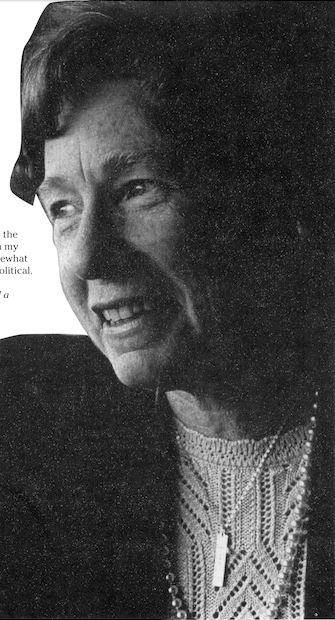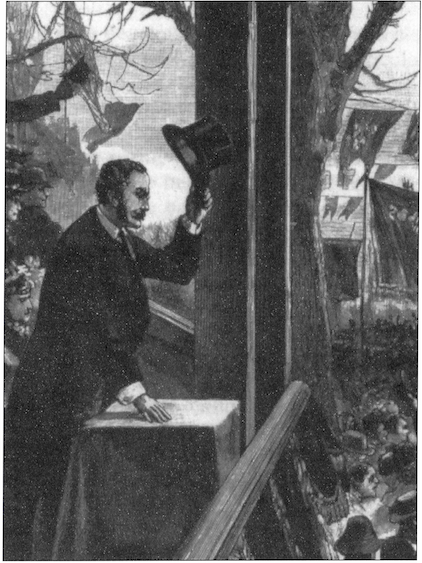
Catherine Shannon, Professor of History at Westfield State College in Massachusetts, has been actively promoting Irish-American academic exchange for many years, both in her own career and in organisations such as the American Committee for Irish Studies. Peter Collins talked to her recently.
PC: Tell us about your background.
CS: I was born in Boston and was very conscious of my Irish roots. My maternal grandparents came from County Mayo and my paternal ones from west Cork, from the Rosscarbery district. Relatives of my mother’s were continually travelling back and forth from Mayo and as a child I became curious about Irish history. My father’s background was different. My paternal grandfather was a fourteen-year-old orphan when he emigrated from Cork and settled in New York. He was very involved in the Irish cause and ran an underground newspaper for O’Donovan Rossa. He was also a close friend of Judge Daniel F. Cohalan of the Friends of Irish Freedom. Later he was one of the founding members of the American Irish Historical Society. So while on my mother’s side the interest in Ireland was somewhat nostalgic, on my father’s it was much more political.
PC: Is your career as a historian of Ireland a logical extension of your family background?
CS: Yes, but also perhaps a bit of a reaction to my primary school days where the ethos was very WASPish and there was considerable misinformation about the Irish which made me read more and more so as to counteract the negative stereotypes.
PC: You did your MA in UCD. Have you any particular memories of that period?
CS: To be a UCD student in the early sixties was magic. You were right in the centre of the city and close to all the libraries. You had easy access to some of the leading historians of the day who were very generous with their time. The depression of the fifties had given way to the optimism of the early sixties. Kennedy had just been elected and it seemed that all things were possible. And yet at the same time Dublin retained a very friendly and intimate kind of atmosphere which I think has since disappeared.
PC: Were you treated any differently as an Irish-American?
CS: Not really. There was more curiosity that I was a woman postgraduate, a rarity in those days.
PC: You have been very active in the American Committee for Irish Studies (ACIS). What is the ACIS?
CS: The ACIS was founded in the early 1962 by historians in America who felt starved for conversation about Irish history and Irish studies. Emmet Larkin and Larry McCaffery were among the founders. It provided a convivial forum where scholars could meet annually. At the first conference dinner that I attended in 1968 there were thirty people crowded into the basement of an Italian restaurant. Now the ACIS annual national conferences attract about 350-400 people and it has become broadly inter-disciplinary. You have literary scholars, sociologists, anthropologists as well as historians networking and presenting papers. Some of the integrative function between the disciplines that characterised the earlier days has been lost because the larger conference attendance necessitates multiple sessions. Yet this is counter-balanced by the smaller annual regional meetings in New England, the mid-Atlantic, the southern states, the mid-west and on the Pacific coast. The regionals are especially valuable in enabling younger historians and graduate students to meet senior scholars and to gain experience in presenting their research. The ACIS has been crucial in institutionalising Irish studies on American.
PC: How best could future cross-fertilisation of Irish history and Irish studies between both sides of the Atlantic be encouraged?
CS: One encouraging development has been having the ACIS annual conference in Ireland every few years which strenthens the bonds across the Atlantic. In 1995 we will be at Queen’s University, Belfast. But this is not enough. It is very difficult financially for Americans who are doing doing graduate work in Irish history to come over to do extended research and something has to be done to make that possible. Equally we need to enable Irish historians to come to the United States, particularly if they are researching emigration history or Irish American history. We need more faculty exchanges across the Atlantic, and not just in the major universities, but also at institutions like my own Westfield State College. A few years ago Sean Farren from the University of Ulster came to us and co-taught a course with me on Northern Ireland which stimulated tremendous interest resulted in a group of our students eventually going to Northern Ireland to do their practice teaching. Securing the resources to further such contacts from, say, the International Fund for Ireland or the Ireland Fund should be a top priority. One or two Fulbright scholarships to Ireland are not enough.
PC: Did you detect any differences in outlook between the newer arrivals from Ireland and the older generation?
CS: The newer generation is less inclined to have a traditional Irish nationalist outlook and is somewhat suspicious of the romantic view of Ireland held by some Irish Americans. Yet most of our ‘New Irish’ have integrated very well into the Boston community and they are more interested in discovering the pluralism of America, which is a very healthy sign. On the other hand there are immense problems for those who do not have legal status. They stay with their own because of fear of exposure to the Immigration and Naturalision Service and that can create a very isolated way of life and inhibit their taking full advantage of the opportunities available in America.
PC: There has been a certain unease amongst the Irish community in Britain with the drift of modern Irish historical scholarship. Has it been the same amongst Irish-Americans?
CS: Yes, this would be so for some for two reasons. First, views of Irish history tend to get atrophied when people have been away from Ireland for a long time and cannot get back frequently. Second, there may be a kind of guilt complex amongst those who have left Ireland and do not carry the day-to-day burden of responsibility for the problems of this island. They find the so-called ‘revisionist’ writing problematic. On the other hand, there is a sizable market toe new interpretations among the general Irish American reader given that Roy Foster’s Modern Ireland and Padraig O’Malley’s Uncivil Wars and Biting at the Grave were on the New York Times bestseller list for at least six months.
PC: ACIS conferences have been forums for debate on Irish historiography. Do you have any views on this debate and about revisionism in particular.
CS: My training at Earlsfort Terrace taught me that no one is without some biases and that we must be very conscious of them in our own work and in evaluating other historians. What I find worrying is the way in which this debate has become so politicised and personalised. People are entitled to hold their own views, but they should be less passionate towards those with whom they disagree if we are to learn from each other and move the historical debate forward.
PC: Your major work is a biography of Arthur Balfour. What light has this shed on this period of history?
CS: Earlier studies of Balfour had stopped at 1891-2 whereas my biography went further chronologically and analysed his views and his involvement in the Irish question up to 1922. It set a context for the study of Tory policy towards Ireland over a forty-year period. I also highlighted some of the constructive things that Balfour did, particularly the land acts which brought about a social revolution. He had a major influence on the drafting of the 1920 Government of Ireland Act. At a time when Walter Long strove for a nine-county partition so as to encourage eventual unity, Balfour’s intervention helped to guarantee a six-county division, which partially explains why we are where we are today.

PC: You have been long associated with women’s history and the history of women. What is your view of the current state of women’s history?
CS: It is now centre stage. The record numbers who attended the 1993 conference of Irish historians in Belfast on the theme of women’s’ history is proof of that. Women’s history is now very much informed by a professional approach. Its gendered and class analyses are profoundly changing our understanding of modern Irish economic and social history in Ireland—Mary Cullen’s work on the role of women in the pre-famine economy and Joanna Burke’s on the Irish rural housewife are notable examples of works enabling Irish women to repossess their past.
PC: A recent project has been a series of interviews with Northern Irish women. Tell us about that?
CS: I had been involved in a number of initiatives to bring politicians and academics from both communities together for discussions in America. In most of these the status of women and how the troubles affected them in their daily lives was totally neglected. The few articles and books that were available tended to depict women either as ‘godmothers of hate’ or as paralysed victims. To gain a more accurate view, I engaged in a number of interviews over the last seven years. I found that it was an amazingly complex situation for women in Northern Ireland. They have exhibited tremendous courage and initiative in trying to mitigate the terrible effects of violence. Much of this work has gone completely unrecognised. It is the women who have managed to keep some contacts between the two communities, and to highlight the damaging long-range effects of the conflict for the next generation. They are much more practical in approaching the political and constitutional question. They see clearly the need for compromise by all sides. The problem is that they have no formal political power in Northern Ireland. They need to be given space on the political stage so that they can influence the peace process more directly. As a group they have experiences, skills and abilities that can facilitate the wider sense of community that is essential to a just and permanent peace.
PC: But is it history?
CS: Obviously there are numerous methodological problems, which bothered me initially given my traditional historical training. Oral history was quite a big jump but I think it is crucially important that we record the experiences of these women. Otherwise they will be lost because most of them do not have the time or the resources to record their lives. My interview material will have to be set in context using some of the recently published social science studies on Northern women.
PC: What historians have you been most influenced by in your career?
CS: T. Desmond Williams, my supervisor at UCD, was a major influence and trained me always to ask the next question, to move beyond the obvious. Perry Curtis gave valuable guidance when I was working on the Balfour book. Margaret MacCurtain has provided great encouragement and sound advice on my current work on Northern women.
PC: Is there any particular Irish history book that you would like to have written yourself and why?
CS: I would like to have written Marianne Elliott’s book on Wolfe Tone. It is a wonderful book, both in her handling of the archival evidence and for its great literary style. I also have great admiration for Nicholas Mansergh’s The unresolved question: the Anglo-Irish settlement and its undoing 1912-1972.
PC: Have you any comments on current trends in Irish history?
CS: The growing interest in women’s history is a positive development and the huge amount of eighteenth-century material coming on stream is broadening our understanding of that era. Regional and local histories are also proving very important in enabling the public to see the rich mosaic of Irish history and perhaps to help break down some of the ideological structures and frameworks in which we have been working in the past.